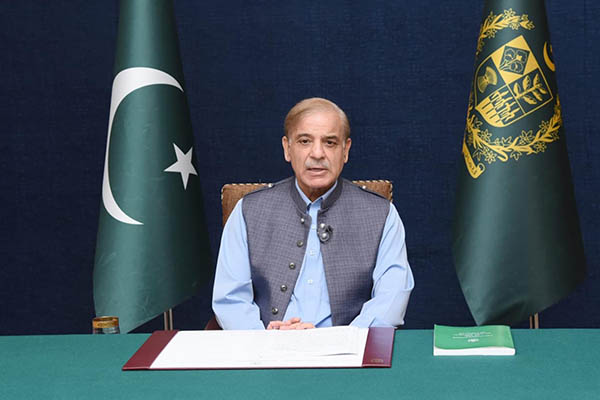
Photo courtesy PID
In his first nationally televised address since assuming the premiership, Prime Minister Shehbaz Sharif on Friday announced a relief package of Rs. 28 billion for the most impoverished Pakistanis in a bid to reduce the impact of inflationary pressures instigated by a hike in fuel prices.
On Thursday night, Finance Minister Miftah Ismail announced that the new coalition government had decided to withdraw some of the fuel subsidy announced by ousted prime minister Imran Khan, saying it was not sustainable and risked harming the country’s economy. The reversal of the subsidy has been repeatedly stressed as a key requirement of the International Monetary Fund to restore a suspended Extended Fund Facility that is key to stabilizing the economy.
In his speech, the prime minister said that his government was taking “tough” decisions in the national interest. Reiterating allegations of the ousted Pakistan Tehreek-e-Insaf (PTI) government endangering the country’s economic and foreign policies, he claimed this had been done to boost the party’s personal, political interests.
Summarizing the prevailing global situation, Sharif noted that global oil prices showed no signs of declining and the resulting fuel crisis was being felt by all, including Western nations. Rather than working to reduce its impact on the most impoverished, he claimed, the previous government had announced a fuel and power subsidy in its last days to boost its political standing. The country, he stressed, cannot sustain this burden.
“We took the decision [to increase oil prices] because it was necessary to avoid default,” he said, adding that this was a step toward steering the country out of its economic crisis.
While the prime minister’s address did not provide many specific details of the relief package—the finance minister told local media he would furnish specifics in a press conference today (Saturday)—he said the total value was Rs. 28 billion, adding that this would be included in the federal budget for the upcoming fiscal year. He said that 14 million of the country’s most impoverished households, representing a third of the population, would receive Rs. 2,000 per month in addition to the grants they were already being provided under the Benazir Income Support Program.
Similarly, he said, the Utility Stores Corporation would provide 10kg bags of flour for Rs. 400.
Tough situation
Thanking the public for electing him the prime minister, Sharif commenced his speech by stressing that assuming the premiership at this juncture was a true test. “When we came into power, each sector was in ruins,” he claimed, adding that the new coalition government had been aware that steering the country back toward prosperity was a major challenge.
Regretting the political discourse in Pakistan was now filled with “hate” and “abuse,” he said “one man”—a reference to PTI leader Imran Khan, whom he did not name—had concocted a “foreign conspiracy” that had been refuted by both the National Security Committee, as well as the ambassador whose diplomatic cable had been used as the basis for it. “For his personal political gain, he is harming Pakistan’s diplomatic relations. Pakistan will be governed by the Constitution, not one man’s whims,” he said.
“Due to the faulty policies of the previous government, all our friendly countries are upset. We will restore fraternal relations with them,” he said, emphasizing that Pakistan wanted peace in South Asia and for India to reverse its Aug. 5, 2019 abrogation of the special constitutional status of Jammu and Kashmir. Once this was done, he said, Pakistan and India could meet for dialogue to resolve all issues.
Detailing the situation inherited by his government from the PTI, he said inflation had been at its peak and all businesses had been suffering. When the PMLN last left the government in 2018, he said, Rs. 115 was equal to the U.S. dollar. The new government had come into power with the dollar at Rs. 189, he added.
Claiming that the PTI had added Rs. 20,000 billion to the country’s overall debt, he said this was equivalent to 80 percent of the debt taken on by all previous governments combined. He claimed the country’s deficit was at its highest point in history, and blamed the ousted government’s “criminal negligence” for shutting down 7,900MW power plants by not procuring fuel or providing them maintenance. This, he maintained, was responsible for the current loadshedding being experienced nationwide.
He recalled that it was the PTI that had signed a deal with the IMF that the current government was being forced to continue under. “We did not agree to the strict conditions laid forth by the IMF; you burdened the masses with heavy inflation, not us; you buried the country under heavy debts, not us; international institutions said that corruption increased during your tenure, not ours; electricity load shedding was brought back during your tenure and you are responsible for the economy’s suffering,” he added.
Other concerns
The prime minister said that his government had decided to restore the National Action Plan “to its true spirit,” and was revising it in consultation with the provinces to tackle the resurgence of terrorism. He said all parties in the coalition government would sit together to figure out a way to revive the ailing economy under a “Charter of Economy,” and invited the PTI to participate in the national interest.
On media freedom, the prime minister said the incumbent government had abolished the Pakistan Media Development Authority introduced by the previous regime. He said he hoped for a Pakistan where people would tolerate differences of opinion and would not resort to abuse; where women, minorities and laborers enjoyed their due rights; and where there was no inflation.
